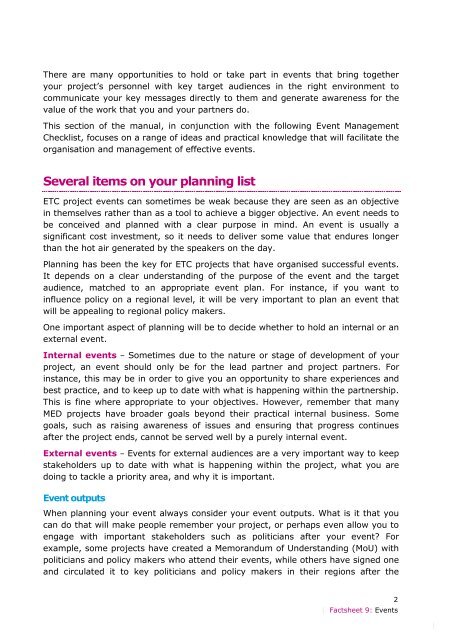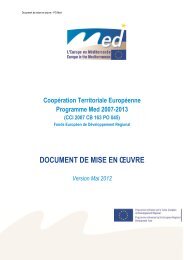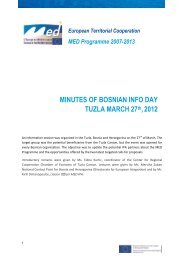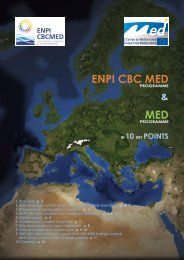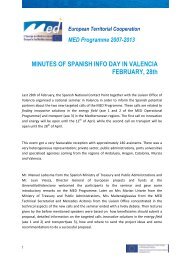MED Communication Handbook - Programme Med
MED Communication Handbook - Programme Med
MED Communication Handbook - Programme Med
Create successful ePaper yourself
Turn your PDF publications into a flip-book with our unique Google optimized e-Paper software.
There are many opportunities to hold or take part in events that bring together<br />
your project’s personnel with key target audiences in the right environment to<br />
communicate your key messages directly to them and generate awareness for the<br />
value of the work that you and your partners do.<br />
This section of the manual, in conjunction with the following Event Management<br />
Checklist, focuses on a range of ideas and practical knowledge that will facilitate the<br />
organisation and management of effective events.<br />
Several items on your planning list<br />
ETC project events can sometimes be weak because they are seen as an objective<br />
in themselves rather than as a tool to achieve a bigger objective. An event needs to<br />
be conceived and planned with a clear purpose in mind. An event is usually a<br />
significant cost investment, so it needs to deliver some value that endures longer<br />
than the hot air generated by the speakers on the day.<br />
Planning has been the key for ETC projects that have organised successful events.<br />
It depends on a clear understanding of the purpose of the event and the target<br />
audience, matched to an appropriate event plan. For instance, if you want to<br />
influence policy on a regional level, it will be very important to plan an event that<br />
will be appealing to regional policy makers.<br />
One important aspect of planning will be to decide whether to hold an internal or an<br />
external event.<br />
Internal events – Sometimes due to the nature or stage of development of your<br />
project, an event should only be for the lead partner and project partners. For<br />
instance, this may be in order to give you an opportunity to share experiences and<br />
best practice, and to keep up to date with what is happening within the partnership.<br />
This is fine where appropriate to your objectives. However, remember that many<br />
<strong>MED</strong> projects have broader goals beyond their practical internal business. Some<br />
goals, such as raising awareness of issues and ensuring that progress continues<br />
after the project ends, cannot be served well by a purely internal event.<br />
External events – Events for external audiences are a very important way to keep<br />
stakeholders up to date with what is happening within the project, what you are<br />
doing to tackle a priority area, and why it is important.<br />
Event outputs<br />
When planning your event always consider your event outputs. What is it that you<br />
can do that will make people remember your project, or perhaps even allow you to<br />
engage with important stakeholders such as politicians after your event? For<br />
example, some projects have created a Memorandum of Understanding (MoU) with<br />
politicians and policy makers who attend their events, while others have signed one<br />
and circulated it to key politicians and policy makers in their regions after the<br />
2<br />
� Factsheet 9: Events<br />
�


